Event Virtual
GENeva Environment Dialogues | IUCN World Conservation Congress
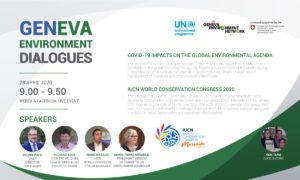
28 Apr 2020
09:00–09:50
Venue: Live | Webex Event & Facebook
Organization: Geneva Environment Network
The International Union for Conservation of Nature (IUCN) and the Government of France have postponed the IUCN World Conservation Congress 2020 in Marseille to 7-15 January 2021 from its original date of 11-19 June 2020. The IUCN World Conservation Congress, held every four years, is dedicated to knowledge-sharing in the fields of science, policy-making and practices on nature conservation and sustainable development.
About the GENeva Environment Dialogues
The GENeva Environment Dialogues’ special COVID-19 series discusses the impacts of the pandemic on the global environmental agenda. Experts are concerned that the world is losing critical time to turn around alarming trends in biodiversity loss, climate change, sound management of chemicals and other environmental threats.
The series addresses the following topics:
- The impact of the crisis on the invited organization activities
- The response of the invited organization to the COVID-19 crisis
- The impacts on the preparations of the conferences and negotiations they are hosting
- New schedules and programmes for these conferences and negotiations
Speakers
Facilitators: GEN Team
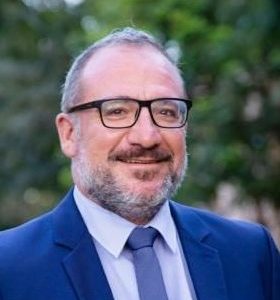
Bruno POZZI
Director, UNEP Europe Office
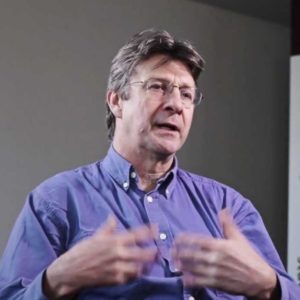
Richard KOCK
Co-Chair, IUCN SSC Wildlife Health Specialist Group
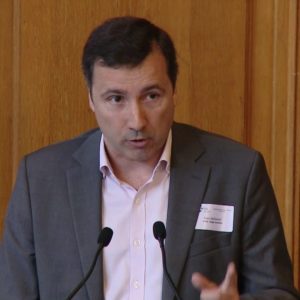
Marc MAGAUD
Forum Manager, IUCN Congress
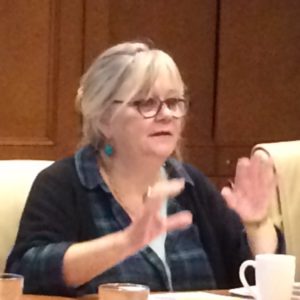
Marie-Pierre MEGANCK
Environment Councilor, Permanent of France to the UN in Geneva
Summary
Welcome
Moderated by: Diana Rizzolio, Coordinator, Geneva Environment Network
The Geneva Environment Network has the pleasure to welcome you today virtually for the launch of the GENeva Environment Dialogues new series, focused on the impacts of the COVID-19 pandemic on the global environmental agenda. This new series of events will take place bi-weekly and is aimed at keeping you informed on the latest developments of major upcoming negotiations.
Those who generally attend our events in Geneva know that, although our events are broadcasted live, we like to organize physical meetings, where our guests can have informal discussions with other guests or with the experts involved. Unfortunately, most of us are closed at home for a few more weeks or months, and therefore we reconnect with our usual public and some new guests through these virtual events.
Today we have invited IUCN, the International Union for Conservation of Nature, to discuss the links between COVID-19 and biodiversity, their response to the COVID-19 pandemic, and also the impact the current crisis has on their activities, particularly on the organization of the IUCN World Conservation Congress that was scheduled to take place in June this year, in Marseille.
Bruno Pozzi, Director, UNEP Europe Office
- Important to keep environmental agenda on top of the wave
- Sanitary and health crisis is the priority
- Environmental crisis is there to stay and we need to dialogue on that
- Pandemic has strong impact on agenda for the year
- We need to work to put the environmental agenda at the top of the political agenda for 2020
- COVID-19 has an impact on the processes related to the environment, but they still have to be central in the political scene
- UNEP’s response to COVID-19: build back better
- We must not go back to normal in terms of links to nature, biodiversity and respect to Earth
- We must become greener, more focused on biodiversity, more respectful of nature, reduce emissions
IUCN introduction on the links between biodiversity and COVID-19
Richard Kock, Co-Chair, IUCN SSC Wildlife Health Specialist Group
- Worked in the field for 40 years
- This crisis is an existential issue
- We need to recognize that these diseases are indicators of a bigger problem, fundamentally rooted in biodiversity loss
- Protecting biodiversity is not a matter of enclosing biodiversity in national parks: we must restore ecosystems stability, since it the instability of ecosystems that allows viruses to jump
- Importance of the relation between biodiversity and health
- The conservation community needs to wake up: focused on the problem of biodiversity loss, yet there is a much more fundamental problem than that – the political economy and the way society deals with nature
- Seeing wildlife as threat, as something to dominate to achieve growth – did it too well and internalised this concept to the extreme
- Natural world contains pathogens, but these pathogens are in ecosystemic stability
- Humans disturbed the stability
- We need to worry about our interaction with nature, not about wildlife per se
- Biodiversity is already so small – domesticated animals are the majority of animals
- Zoonotic diseases, which means pathogens that jump from one species to a different one, are extremely rare – examples are HIV and SARS
- Bats are not the problem, they have the base of the virus, but it evolves in humans because of our relation with the natural world
- Ensuring that the Congress has an impact is essential, since going back to Business As Usual is impossible
- We need to get the message out to everyone, not only to the engaged community of conservationists
- Biodiversity loss is still going on
- Need to engage the general public, politicians and businesses
- Climate Change issue has done a better job – people believe and feel and sense what is going on
- With conservation we have to do the same, the Congress has to have a subject that affects everyone – the health-nature interaction
- It affects people directly
- It has impacts on society and economy
- We must get out a clear message
IUCN on the impacts of COVID-19 on their activities
Marc Magaud, Forum Manager, IUCN Congress
- We hope to be back to normal activity in January 2021, when the IUCN World Conservation Congress will take place
- Introduction to the event:
- Very large venue, over 10.000 delegates, several tens of thousands of visitors
- Exhibition hall – 40 pavilions, some changes because of the COVID-19 situation
- Same structure as of June: several parts with different purposes for different publics
- Forum for registered participants (academia, business, decision makers, civil society)
- Espace génération-nature – targeted to the general public and the youth
- Member’s assembly – statutory requirements
- Additional costs for change of logo, reconfiguration of heating, outside structure, accommodation, amend contracts, revise security (with added social distancing measures)
- Processes are affected: election of IUCN Council and approval of the programme – need to rethink deadlines and processes
- Difficult to keep the momentum: sequence of environment-related events postponed but the order remains the same
- Risk of losing the attention on topic of nature
- Need for a large scale consideration on virtualization and digitalization
- The themes are not related to health at the moment, but health of humans and of ecosystems will be a cross-cutting topic throughout the themes of the Congress
- Likely to have economic turmoil and social changes in the world post-pandemic – how are these changes (emissions, trade, political institutions) going to change the way we do things?
- Structure of the Forum will not change, but delivery mode might change
- High-level plenaries are focused around themes not health-related, but those themes will be infused because of the ramifications of the COVID-19 pandemic
France on the impact of COVID-19 on the IUCN World Conservation Congress
Marie-Pierre Meganck, Environment Councilor, Permanent Mission of France to the UN in Geneva
- France remains committed the IUCN World Conservation Congress and continues to work on the global environmental agenda
- France as host country with IUCN decided to postpone IUCN WCC
- The Congress doesn’t change its nature, neither the stakes for France
- Important for the development of a new global biodiversity framework
- Needed more than ever to keep the momentum
- For France, it is an historical moment: first time host of the IUCN WCC, even though France is one of the founding members of IUCN and IUCN was founded in Fontainebleau
- The Congress will be held in Marseille, on the Mediterranean Sea – a meeting point of three continents (Europe, Asia, Africa)
- We need global mobilization for ambitious global action to address the accelerated erosion of world biodiversity
- A lot of components of the Congress remain stable, even though it was impacted by the disruptions due to the pandemic
- The link between human and planet health will be a big theme, as well as the reconfiguration of the relation between planet and human health
- Opportunity for the transversal integration of biodiversity in the debate on the recovery post-COVID-19
- The meeting is a crucial multistakeholders and multilateral event, and an opportunity to have all stakeholder involved in the environmental agenda
- The role of international Geneva in the implementation of 2030 agenda is essential, as it constitutes a big contributor to multilateral action
Closing remarks, questions and answers
Bruno Pozzi
- We heard from everyone that we need to keep the momentum on the Super Year for Nature and that we need to change the way we look at these events
- UNEP’s building back better strategy is shared by all international organizations and the Member States
- How do we put nature, climate change, biodiversity, our relation with the planet together?
- We lost a lot of biodiversity already, we are the main trigger of this loss
- Wildlife is not a problem, it is our attitude towards wildlife that is problematic
- We all have a role in the advocacy for nature conservation: with family, with friends, with colleagues, and at the polls
Q. J.P. Reymond, Permanent Mission of Switzerland to the UN in Geneva: What are the most urgent actions to avoid the next pandemic?
R. Kock
- How do we engage with health sector to understand the emergence of diseases?
- For nature health there is not the same capacity as for human health
- Investment on human health is enormous: WHO, national healthcare systems, …
- Investment on animal and plant health is considerable: need to protect crops and domesticated animals
- Investment on wildlife and natural health is almost inexistent: there is not capacity to analyse and prevent zoonotic diseases
- We need a new health sector that can focus on the problem of wildlife and nature health to address the issue of zoonotic disease
- For example: the Nipah Virus emerged in Malaysia, Philippines, Bangladesh – it spilled over from bats to pigs, from pigs to people – the spill over from wildlife to domestic animals, and then to humans – the ecological changes we made caused the spill over, in this case, placing pig farms close to fruit trees that attracted bats
- Environmental change can have extraordinary effects on microbial ecosystems
- This is an existential threat to humankind, only one microorganism could wipe out the entire human species and we don’t have the capacity to look into this problem
- The peer-reviewed publications on COVID-19 at the moment are around 800, most of which are technological responses to the problem and are not dealing with the root cause of it
- To address the issues at their source, we need to build capacity
- When we develop the vaccine for COVID-19, we will have a new pandemic taking us by surprise because we haven’t addressed the root causes of spill overs and zoonotic diseases
M. Magaud
- We need to get the message out
- The opening session of the Congress was about seeking systemic change, completely rethinking the system
- There will be forces opposing the change, asking for lower carbon ambition, stripping environmental regulations for the sake of economic growth
- We need to think differently about technological fixes to natural problems
- We will need to go more virtual during the World Conservation Congress
M.P. Meganck
- We need to build back better, safer, more ecologically
- There are different opinions, ways of thinking on the post-pandemic world and we don’t know where we are going
- Congress and the international agenda have to push for change, integrating climate and biodiversity
R. Kock
- The pandemic is going to change public health: consider that two of the worst affected countries rank high in healthcare efficiency
- Modern systems are creating weaknesses in our society and more integration, not less, with nature is essential, otherwise we will not be able to cope with future spill overs
Questions not directly addressed during the live stream
Q: How can we prevent human interaction with nature stop the spread of the zoonotic diseases?
R. Kock
- Biosecurity is an important issue e.g. hygiene and reduced contact between infected and non-infected hosts, for example in preventing disease spread and transmission and this is fundamental to public and animal health in our domestic environment, it does not address the underlying cause for disease itself
- The emergence of diseases is mostly due to loss of endemic stability (we partially deal with this in modern human society and animal agriculture through vaccines which mimic natural infection) – this natural exposure is lost when we or our domestic animal step out of nature into our domesticated environment
- It is the interaction with our natural world which ensures resilience
- When we breed animals for our purposes, they lose resilience, and when we create an artificial world butting against the natural world we suffer from our loss of resilience whilst the natural world soldiers on without microbial concerns or disease as we know it and spill over can occur
- This is why we need medicine and preventive therapies to tackle this spill over but if well directed to simulate what we have lost and recover our nature health linkages
- That is why I argue to prevent the spill over we need to be reconnecting with nature, not the opposite,
- The problem is that, when you try to reconnect 7 billion people with nature, the consequences can be disastrous, but we can help by
- reducing our domestic animal population
- stabilising our human population and exploring how to reintegrate humanity into natural systems
- These changes would be implemented by removing vast tracks of land currently dedicated to food systems and animals, then nature and biodiversity can recolonise and recover and provide that opportunity for surviving humanity to recover its health in due time
Q: Can we make this an opportunity to have a more virtual conference and reduce its environmental impact?
M. Magaud
- We are looking into virtualization but it would not substitute the in person events fully. We have already built in some remote-access options, but it appears to be difficult to do full-virtual, among other things because of the exhibition and pavilions.
- We are very wary of the environmental impact and this will be a certified Green Congress with full offset of carbon emissions – one of the few in this size category.
Q: Could we use the conference as a “check point” as to what we have learnt and how we are doing in terms of changing our ways – travelling, consuming, agriculture etc in reaction to coronavirus?
M. Magaud
- Excellent idea: we should indeed take stock of what has come to be in the upcoming months and try to set the agenda on this basis for 2021.
Q: On the failure of communication: how are social networks integrated into the preparation of this congress? Instagram for example?
M. Magaud
- Our communications team is already quite active in the social networks, including Instagram. And for sure, the digital natives will be looking for this kind of tool, especially for the Youth summit.
Documents
- IUCN Presentation
- 2019-nCoV in context: lessons learned? Richard Kock et al., The Lancet Planetary Health, 6 February 2020.
Video
The event was live on Facebook.
